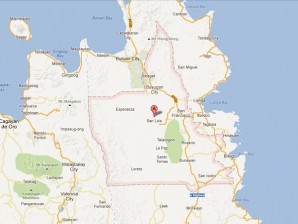Agusan del Sur solves power problem; consumers to pay more
 SAN FRANCISCO, Agusan del Sur—There will be no more irritating daily four-hour brownouts in this province by August, but residents will have to pay as much as P10 per kilowatt hour for electricity to defray the cost of operating modular generating sets.
SAN FRANCISCO, Agusan del Sur—There will be no more irritating daily four-hour brownouts in this province by August, but residents will have to pay as much as P10 per kilowatt hour for electricity to defray the cost of operating modular generating sets.
The Agusan del Sur Electric Cooperative (Aselco) has opted to secure a soft loan from the National Electrification Administration (NEA) to acquire the diesel generating sets that will help end the daily rotating outages in the province.
The NEA loan is part of the solution offered by Energy Secretary Jericho Petilla to Mindanao electric cooperatives during a recent meeting in Manila to address the worsening power crisis in Mindanao until new power plants under construction come on stream in 2015.
The solution, however, would mean an increase of P1.80 to P4 per kilowatt hour for the power consumers in Mindanao.
Emmanuel Galarse, Aselco general manager, said the board of directors has decided to take the third option of acquiring the NEA loan with an interest rate of six percent per year with a two-year grace period before deciding whether to buy the modular generating sets or return them to the government.
The government has offered two other options as an immediate solution to the power crisis in Mindanao—for electric cooperatives to rent the diesel generating sets at P1.4 million per megawatt per month and for the cooperatives to buy their own generating sets at an estimated cost of P22 million per megawatt.
“We find the third option to be ideal for us considering our financial capability,” Galarse said at a press conference Monday.
Since the onset of the energy crisis in Mindanao this year, Aselco has been short by an average 10,000 kilowatt per month and this was expected to increase 13,000 kilowatts this month.
Aselco’s power demand averages 23,000 kilowatts per month but different suppliers can provide only average of 12,000 kilowatts per month.
Galarse said the entry of Mapalad Power Corp. as a new power distributor would slowly stabilize the shortage in the following months and would further go down to as slow as 1,400 kilowatts by August this year if the plans to buy the generating sets would push through.
The planned increase has already drawn criticism from local consumers.
Renato Navarro, a government worker, said this would be very painful for low-income families like him since this would mean an additional P400 for electricity bills.
“Why can’t the government subsidize this or scrap the 12 percent value added tax?” Navarro said.
Frederico Blanco, chair of the San Francisco Growth Enhancement Multi-Purpose Cooperative, said he hoped Aselco would not pursue the plan since it would cause more hardships to most people in this impoverished province.
Ceferino Paredes Jr, a two-termer former congressman who is not seeking any elective post in the coming election, said most residents could not afford higher power rates.
“There is no way that we can develop our province with such very high cost of electricity.” He blamed the shortage of power on poor management by Aselco.
Aselco said it will be engaged in an intensive campaign to appeal to the consumers to voluntary unplug appliances like refrigerators, air-conditioning units and unnecessary lights during peak hours, from 5 p.m. to 9 p.m., to cushion the impact of the rotating brownouts.
In response to various complaints from the government offices, Aselco has distributed the 4.5 daily rotational brown into 1.5 hours each in the morning, afternoon and evening.














